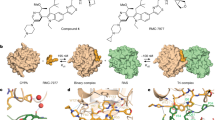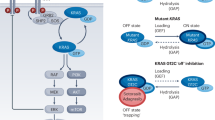Abstract
MK-0457, an Aurora kinase and BCR–ABL inhibitor, was studied on a Phase I/II study in 77 patients with refractory hematologic malignancies. The average number of cycles per patient was 3 (range 1–21). Maximum tolerated doses for a 5-day short infusion and continuous infusion regimens were 40 mg/m2/h and 144 mg/m2/h, respectively. Drug-related adverse events (AEs) included transient mucositis and alopecia. Eight of 18 patients with BCR–ABL T315I-mutated chronic myelogenous leukemia (44%) had hematologic responses and one of three patients (33%) with Philadelphia chromosome-positive acute lymphoblastic leukemia obtained complete remission. MK-0457 has important activity in patients with leukemias expressing the highly resistant T315I BCR–ABL mutation.
This is a preview of subscription content, access via your institution
Access options
Subscribe to this journal
Receive 12 print issues and online access
$259.00 per year
only $21.58 per issue
Buy this article
- Purchase on Springer Link
- Instant access to full article PDF
Prices may be subject to local taxes which are calculated during checkout
Similar content being viewed by others
References
Burke AC, Swords RT, Kelly K, Giles FJ . Current status of agents active against the T315I chronic myeloid leukemia phenotype. Expert OpinEmerg Drugs 2011; 16: 85–103.
Burnett A, Wetzler M, Lowenberg B . Therapeutic advances in acute myeloid leukemia. J Clin Oncol 2011; 29: 487–494.
Carmena M, Ruchaud S, Earnshaw WC . Making the Auroras glow: regulation of Aurora A and B kinase function by interacting proteins. Curr Opin Cell Biol 2009; 21: 796–805.
Ruchaud S, Carmena M, Earnshaw WC . The chromosomal passenger complex: one for all and all for one. Cell 2007; 131: 230–231.
Carmena M, Earnshaw WC . The cellular geography of aurora kinases. Nat Rev Mol Cell Biol 2003; 4: 842–854.
Kimura M, Matsuda Y, Yoshioka T, Okano Y . Cell cycle-dependent expression and centrosome localization of a third human aurora/Ipl1-related protein kinase, AIK3. J Biol Chem 1999; 274: 7334–7340.
Green MR, Woolery JE, Mahadevan D . Update on Aurora Kinase Targeted Therapeutics in Oncology. Expert Opin Drug Discovery 2011; 6: 291–307.
Bischoff JR, Anderson L, Zhu Y, Mossie K, Ng L, Souza B et al. A homologue of Drosophila aurora kinase is oncogenic and amplified in human colorectal cancers. EMBO J 1998; 17: 3052–3065.
Miyoshi Y, Takahashi Y, Lee H, Suzuki T, Komeda T . Association of centrosomal kinase STK15/BTAK mRNA expression with chromosomal instability in human breast cancers. Int J Cancer 2001; 92: 370–373.
Sakakura C, Hagiwara A, Yasuoka R, Fujita Y, Nkanishi M, Masuda K et al. Tumour-amplified kinase BTAK is amplified and overexpressed in gastric cancers with possible involvement in aneuploid formation. Br J Cancer 2001; 84: 824–831.
Libertini S, Abanale A, Passaro C, Botta G, Portella G, Aurora A . and B kinases-targets of novel anticancer drugs. Recent Patents Anti-Canc Dr D 2010; 5: 219–241.
Portella G, Passaro C, Chieffi P, Aurora B . A new prognostic marker and therapeutic target in cancer. Curr Med Chem 2011; 18: 482–496.
Harrington EA, Bebbington D, Moore J, Rasmussen RK, Ajose-Adeogun AO, Nakayama T et al. VX-680, a potent and selective small-molecule inhibitor of the Aurora kinases, suppresses tumor growth in vivo. Nat Med 2004; 10: 262–267.
Karthigeyan D, Prasad P, Shandilya J, Agrawal S, Kundu TK . Biology of Aurora A kinase: Implications in cancer manifestation and therapy. Med Res Rev 2010; 5: 757–793.
Tyler RK, Shpiro N, Marquez R, Eyers PA . VX-680 inhibits Aurora A and Aurora B kinase activity in human cells. Cell Cycle 2007; 6: 2846–2854.
Bebbington D, Binch H, Charrier JD, Everitt S, Fraysse D, Golec J et al. The discovery of the potent aurora inhibitor MK-0457 (VX-680). Bioorg Med Chem Lett 2009; 19: 3586–3592.
Li Y, Zhang ZF, Chen J, Huang D, Ding Y, Tan MH et al. VX680/MK-0457, a potent and selective Aurora kinase inhibitor, targets both tumor and endothelial cells in clear cell renal cell carcinoma. Am J Transl Res 2010; 2: 296–308.
Cheetham GM, Charlton PA, Golec JM, Pollard JR . Structural basis for potent inhibition of the Aurora kinases and a T315I multi-drug resistant mutant form of Abl kinase by VX-680. Cancer Lett 2007; 251: 323–329.
Traynor AM, Hewitt M, Liu G, Flaherty KT, Clark J, Scott BB et al. Phase I dose escalation study of MK-0457, a novel Aurora kinase inhibitor, in adult patients with advanced solid tumors. Cancer Chemother Pharmacol 2011; 67: 305–314.
Rubin EH, Shapiro GI, Stein MN, Watson P, Bergstrom D, Xiao A et al. A phase I clinical and pharmacokinetic (PK) trial of the aurora kinase (AK) inhibitor MK- 0457 in cancer patients. J Clin Oncol 2006; 123s: 247.
Giles FJ, Cortes J, Jones D, Bergstrom D, Kantarjian H, Freedman SJ . MK-0457, a novel kinase inhibitor, is active in patients with chronic myeloid leukemia or acute lymphocytic leukemia with the T315I BCR-ABL mutation. Blood 2007; 109: 500–502.
Nicolini FE, Mauro MJ, Martinelli G, Kim DW, Soverini S, Muller MC et al. Epidemiologic study on survival of chronic myeloid leukemia and Ph(+) acute lymphoblastic leukemia patients with BCR-ABL T315I mutation. Blood 2009; 114: 5271–5278.
Kretzner L, Scuto A, Dino PM, Kowolik CM, Wu J, Ventura P et al. Combining histone deacetylase inhibitor vorinostat with aurora kinase inhibitors enhances lymphoma cell killing with repression of c-Myc, hTERT, and microRNA levels. Cancer Res 2011; 71: 3912–3920.
Okabe S, Tauchi T, Ohyashiki JH, Ohyashiki K . Mechanism of MK-0457 efficacy against BCR-ABL positive leukemia cells. Biochem Biophys Res Commun 2009; 380: 775–779.
Nguyen T, Dai Y, Attkisson E, Kramer L, Jordan N, Nguyen N et al. HDAC inhibitors potentiate the activity of the BCR/ABL kinase inhibitor KW-2449 in imatinib-sensitive or -resistant BCR/ABL+ leukemia cells in vitro and in vivo. Clin Cancer Res 2011; 17: 3219–3232.
Gizatullin F, Yao Y, Kung V, Harding MW, Loda M, Shapiro GI . The Aurora kinase inhibitor VX-680 induces endoreduplication and apoptosis preferentially in cells with compromised p53-dependent postmitotic checkpoint function. Cancer Res 2006; 66: 7668–7677.
Cheok CF, Kua N, Kaldis P, Lane D . Combination of nutlin-3 and VX-680 selectively targets p53 mutant cells with reversible effects on cells expressing wild-type p53. Cell Death Differ 2010; 17: 1486–1500.
Kojima K, Konopleva M, Tsao T, Nakakuma H, Andreeff M . Concomitant inhibition of Mdm2-p53 interaction and Aurora kinases activates the p53-dependent postmitotic checkpoints and synergistically induces p53-mediated mitochondrial apoptosis along with reduced endoreduplication in acute myelogenous leukemia. Blood 2008; 112: 2886–2895.
Lowenberg B, Muus P, Ossenkoppele G, Rousselot P, Cahn JY, Ifrah N et al. Phase I/II study to assess the safety, efficacy, and pharmacokinetics of barasertib (AZD1152) in patients with advanced acute myeloid leukemia. Blood 2011; 118: 6030–6036.
Tsuboi K, Yokozawa T, Sakura T, Watanabe T, Fujisawa S, Yamauchi T et al. A Phase I study to assess the safety, pharmacokinetics and efficacy of barasertib (AZD1152), an Aurora B kinase inhibitor, in Japanese patients with advanced acute myeloid leukemia. Leuk Res 2011; 35: 1384–1389.
Donato NJ, Fang D, Sun H, Giannola D, Peterson LF, Talpaz M et al. Targets and effectors of the cellular response to aurora kinase inhibitor MK-0457 (VX-680) in imatinib sensitive and resistant chronic myelogenous leukemia. Biochem Pharmacol 2010; 79: 688–697.
Fei F, Stoddart S, Groffen J, Heisterkamp N et al. Activity of the Aurora kinase inhibitor VX-680 against Bcr/Abl-positive acute lymphoblastic leukemias. Mol Cancer Ther 2010; 9: 1318–1327.
Kelly KR, Ecsedy J, Medina E, Mahalingam D, Padmanabhan S, Nawrocki S et al. The novel Aurora A kinase inhibitor MLN8237 is active in resistant chronic myeloid leukaemia and significantly increases the efficacy of nilotinib. J Cell Mol Med 2011; 15: 2057–2070.
Kelly KR, Ecsedy J, Mahalingam D, Nawrocki S, Padmanabhan S, Giles FJ et al. Targeting Aurora kinases in cancer treatment. Curr Drug Targets 2011; 12: 2067–2078.
Farag SS . The potential role of Aurora kinase inhibitors in haematological malignancies. Br J Haematol 2011; 155: 561–579.
Acknowledgements
We acknowledge the study coordinators, nurses and physicians who contributed to this study, and the patients and their families for their participation. We thank Boyd Scott for editorial assistance. The research of Francis Giles, Arnon Nagler, Andreas Hochhaus, Oliver G Ottmann, David Rizzieri, Moshe Talpaz, Philipp Le Coutre and Jorge Cortes was funded by Merck.
Author information
Authors and Affiliations
Corresponding author
Ethics declarations
Competing interests
Employment or leadership position: Jason Clark, Patricia Watson, Alan Xiao, Baiteng Zhao, Donald Bergstrom, Steven J Freedman—Merck. The remaining authors declare no conflict of interest.
Additional information
Author Contributions
Conception and design: Francis Giles, Arnon Nagler, Andreas Hochhaus, Oliver G. Ottmann, David Rizzieri, Moshe Talpaz, Donald Bergstrom, Philipp Le Coutre, Steven J. Freedman, Jorge Cortes. Collection and assembly of data: all authors. Manuscript writing: all authors. Final approval of manuscript: all authors. Provision of study materials or patients: Francis Giles, Arnon Nagler, Andreas Hochhaus, Oliver G. Ottmann, David Rizzieri, Moshe Talpaz, Philipp Le Coutre, Jorge Cortes.
Rights and permissions
About this article
Cite this article
Giles, F., Swords, R., Nagler, A. et al. MK-0457, an Aurora kinase and BCR–ABL inhibitor, is active in patients with BCR–ABL T315I leukemia. Leukemia 27, 113–117 (2013). https://doi.org/10.1038/leu.2012.186
Received:
Revised:
Accepted:
Published:
Issue Date:
DOI: https://doi.org/10.1038/leu.2012.186
Keywords
This article is cited by
-
Targeting AURKA in Cancer: molecular mechanisms and opportunities for Cancer therapy
Molecular Cancer (2021)
-
Aurora kinase A, a synthetic lethal target for precision cancer medicine
Experimental & Molecular Medicine (2021)
-
Recent Advances in Molecular Diagnosis and Prognosis of Childhood B Cell Lineage Acute Lymphoblastic Leukemia (B-ALL)
Indian Journal of Hematology and Blood Transfusion (2021)
-
DYRK2 controls a key regulatory network in chronic myeloid leukemia stem cells
Experimental & Molecular Medicine (2020)
-
The balance between mitotic death and mitotic slippage in acute leukemia: a new therapeutic window?
Journal of Hematology & Oncology (2019)



